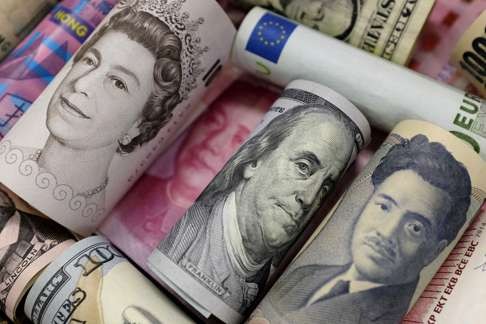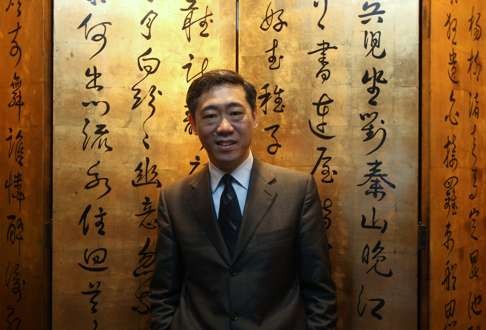Forex reserve safety concerns mean China ‘unlikely to massively sell US debt’
Market experts say it’s more important for PBOC to keep abundant reserves than to maintain a stable yuan rate against the US dollar

China has cut its United States government debt for five consecutive months, taking its Treasury holdings to the lowest level in more than six years and losing its title of the biggest foreign owner of US debt to Japan.
Analysts expect China to continue selling its dollar holdings but a mass sell-off may be unlikely as it is more important for China to keep ample firepower and maintain dollar reserves above the safety line to prevent a potential confidence crisis and safeguard economic stability.
Global central banks dumped a record US$403 billion US government debt in the twelve months to the end of October, according to latest numbers from the US Department of Treasury.
China alone sold US$41.3 billion in October, taking holdings down to US$1.12 trillion as of October, the lowest since July 2010. Japan regained its US debt crown, with US$1.13 trillion of US Treasuries.
“The surging US dollar is causing a headache for the People’s Bank of China,” Oanda Asia Pacific senior trader Stephen Innes said.
A stronger dollar makes US investments more attractive to Chinese investors, leaving the PBOC struggling to stem capital outflow and selling foreign reserves to prop up the yuan.
The yuan last month depreciated 1.7 per cent against the US dollar, ending the month at 6.8894 per US unit.
In the same month, China’s foreign reserves declined by US$69.1 billion to US$3.05 trillion, the lowest level since March 2011. It was also the biggest reduction in a month since January.
Most of China’s foreign reserves are held in US dollar-denominated assets such as US Treasuries.
JPMorgan analysts said in a recent research note: “The sentiment has deteriorated in recent months, especially when it appears that two sensitive thresholds will be breached soon: 7.00 for USD/CNY exchange rate and US$3 trillion for FX reserves.
“A re-enforcing mechanism between sentiment deterioration for domestic investors, capital outflow and currency depreciation pressure is the big challenge faced by the PBOC in the very near term, especially if USD strength continues,” they said.

After the Federal Reserve raised its benchmark rate last week and added one rate increase to its outlook for next year, expectations for a stronger dollar have risen further.
Innes said: “With the USD expected to strengthen into year end, the feedback looks accelerated, leaving the PBOC with little option to burn through reserves to stem the tide.”
However, despite expectations that the PBOC would continue reducing US debt holdings, a mass sell-off seemed unlikely, analysts said, as reducing the reserves to below the safety line may cause a potential confidence crisis.
JPMorgan analysts said US$3 trillion for foreign reserves was a “psychologically important” threshold for investors.
If the threshold was breached investors may become more alarmed about China’s ability to defend the currency, resulting in huge capital-outflow pressure.
Bloomberg Intelligence economists Fielding Chen and Tom Orlik said that, according to methodology developed by the International Monetary Fund earlier this year, China needs to hold US$2.9 trillion in reserves to provide enough buffer should its capital control measures be ineffective.
Yu Yongding, a former adviser to the PBOC and senior fellow at top government think-tank the Chinese Academy of Social Sciences, said in a public speech in Beijing on Sunday: “The most critical issue for China is to maintain the foreign reserves, not maintaining a steady exchange rate.
“We need keep ample firepower to safeguard the stability of the economy,” Yu said.
“If we focus solely on the exchange rate and keep burning down the dollar reserves, it will cause a big problem if the reserves breach a threshold.”

“The PBOC should stop the intervention of the exchange rate and instead tighten the supervision of cross-border fund flows,” he added.
Li Daokui, a current adviser to the PBOC and professor of economics at China’s Tsinghua University, also said publicly over the weekend that a top priority for the PBOC next year was to “strictly control cross-border fund flows” and “resolutely curb the Chinese demand to buy dollars for hedging yuan risks”.
Zhongtai Securities analyst Luo Wenbo said the PBOC had sold lots of US debt holdings to prop up the yuan but it didn’t stop the currency from depreciating.
“The issue is that the central bank only has limited dollar reserves,” Luo said.
“We also believe it’s more important for them to keep abundant reserves than to maintain a stable yuan rate against the US dollar,” he said.
“If the economy grows at a steady pace next year, it will be the best support for the yuan at a reasonable level,” Luo said.